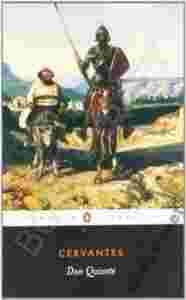|
Miguel de Cervantes's mock-epic masterwork, ''Don
Quixote'' was voted the greatest book of all time by the
Nobel Institute, and this ''Penguin Classics'' edition
is translated with an introduction and notes by John
Rutherford. ''Don Quixote'' has become so entranced by
reading romances of chivalry that he determines to
become a knight errant and pursue bold adventures,
accompanied by his squire, the cunning Sancho Panza. As
they roam the world together, the aging Quixote's fancy
leads them wildly astray, tilting at windmills, fighting
with friars, and distorting the rural Spanish landscape
into a fantasy of impenetrable fortresses and wicked
sorcerers. At the same time the relationship between the
two men grows in fascinating subtlety. Often considered
to be the first modern novel, ''Don Quixote'' is a
wonderful burlesque of the popular literature its
disordered protagonist is obsessed with. John
Rutherford's landmark translation does full justice to
the energy and wit of Cervantes' prose, and this edition
of ''Don Quixote'' won the 2002 Premio Valle Inclan
prize for translation. His introduction discusses the
traditional works parodied in ''Don Quixote'' and issues
of literary translation.Miguel de Cervantes Saaverda's
(1[zasłonięte]547-16) life was occupied with a struggle to earn a
livelihood from literature and humble government
employment. As well as ''Don Quixote'', he wrote a
number of plays and a collection of highly accomplished
short stories, ''Exemplary Tales'' (1613). If you
enjoyed ''Don Quixote'', you might like Homer's
''Odyssey'', also available in ''Penguin Classics''.
''John Rutherford makes ''Don Quixote'' funny and
readable ...His Quixote can be pompous, imposingly
learned, secretly fearful, mad and touching''. (Colin
Burrow, ''The Times Literary Supplement''). |
|

